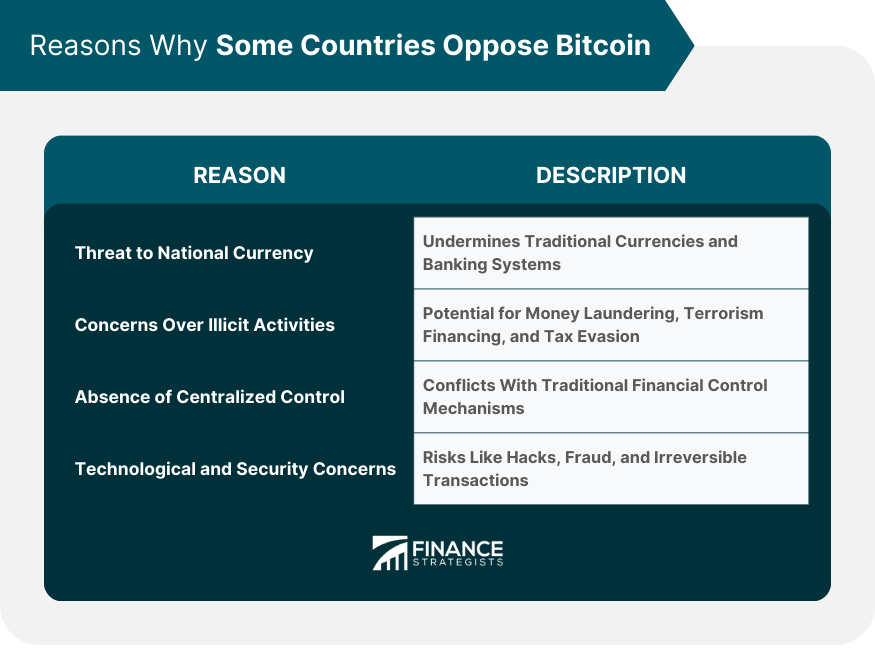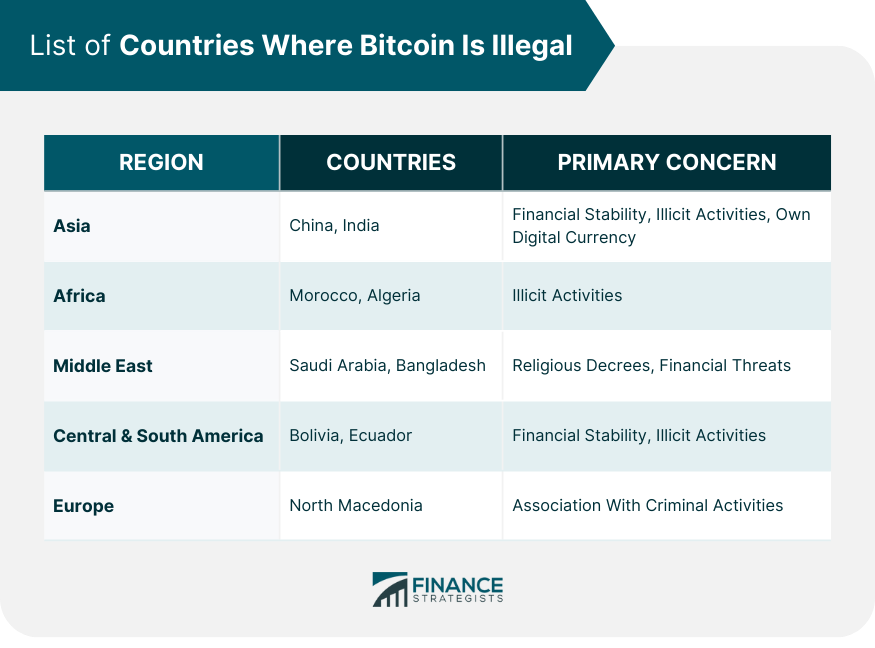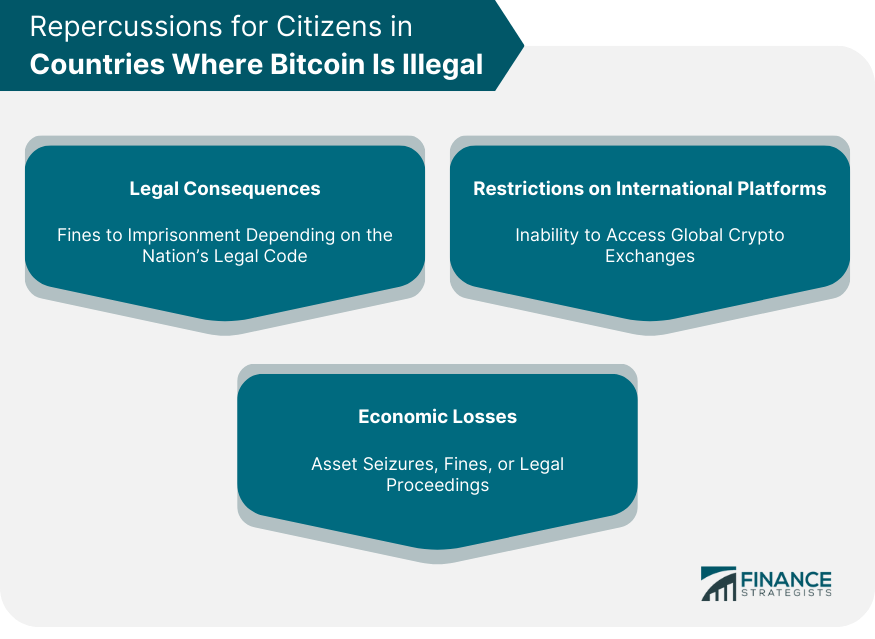While the allure of Bitcoin and other cryptocurrencies has spread globally, not all nations have embraced this digital shift. Some countries have outright banned the use of Bitcoin due to concerns over its potential for facilitating illegal activities, lack of centralized control, and threats to their financial systems. Notably, countries like China have imposed strict regulations on cryptocurrency exchanges, effectively banning the trading of Bitcoin. India, at one point, prohibited banks from processing Bitcoin-related transactions, though it's worth noting that the regulatory landscape there is evolving. Other countries, including Morocco, Bolivia, and Bangladesh, have also implemented bans on Bitcoin trading and usage. The stance of governments varies, with some opting for regulation over prohibition. However, for would-be crypto investors, it's essential to understand the local legal landscape before diving into the Bitcoin world. One of the primary concerns for governments is Bitcoin's potential to undermine national currencies. Given its decentralized nature, Bitcoin poses a challenge to traditional banking systems and monetary policies, leading some countries to outlaw its use to preserve financial stability. The pseudonymous nature of Bitcoin transactions raised concerns over its potential for money laundering, terrorism financing, and tax evasion. Without centralized control, nations felt vulnerable to these illicit activities and moved to regulate or ban Bitcoin. Central banks and governments can't control or regulate Bitcoin's supply or demand, which conflicts with traditional financial control mechanisms. This lack of control has made many countries uncomfortable, pushing them to ban the cryptocurrency. The relatively nascent technology behind Bitcoin brings security concerns. Hacks, fraud, and the irreversible nature of transactions are often cited as reasons for prohibiting the use of Bitcoin. China: Historically open to Bitcoin, China's stance shifted as the crypto industry grew. Concerns over financial stability, capital controls, and a desire to introduce its digital yuan have led to a blanket ban on all crypto activities. India: With a fluctuating position on Bitcoin, India has moved between acceptance and prohibition. Concerns over illicit usage and potential threats to its financial system have prompted periodic crackdowns. The African continent sees a diverse stance on Bitcoin. However, notable nations like Morocco and Algeria have prohibited the use and possession of Bitcoin, primarily citing concerns over its potential for illegal activities. While some Middle Eastern countries embrace blockchain technology, nations like Saudi Arabia and Bangladesh have deemed Bitcoin illegal, pointing to religious decrees and potential threats to their financial ecosystems. The stance on Bitcoin in this region varies. While countries like Brazil and Argentina show leniency, others, including Bolivia and Ecuador, have imposed outright bans. These nations often express concerns about financial stability and the potential for Bitcoin to facilitate illegal activities. Largely has a progressive stance on Bitcoin. However, North Macedonia stands out as one nation that has declared Bitcoin illegal, associating it with criminal activities. Countries that have banned Bitcoin potentially miss out on the growth of a new financial ecosystem. As other nations tap into the economic advantages of the crypto industry, these countries may find themselves economically isolated. Ironically, making Bitcoin illegal can spur growth in black market activities. Unregulated trades and underground exchanges can thrive, posing even more significant challenges to authorities. By resisting the rise of Bitcoin and the underlying blockchain technology, countries risk being left behind in technological advancements. This stagnation can have long-term repercussions on their competitiveness in the global arena. Citizens in countries where Bitcoin is banned face potential legal consequences. These can range from hefty fines to imprisonment, depending on the nation's legal code. Often, countries that prohibit Bitcoin also block access to international crypto exchanges. This move curtails the ability of their citizens to participate in the global crypto marketplace. People who held Bitcoin or other cryptocurrencies prior to a ban might suffer significant economic losses. Their assets can be seized, and they might be slapped with fines or face legal proceedings. As the global acceptance of cryptocurrencies evolves, nations with prohibitive stances may reconsider their positions, especially if they perceive economic or technological benefits they're missing out on. Economic downturns or crises might push countries to explore alternative financial systems, including cryptocurrencies. Such pressures could lead to a reconsideration of their anti-Bitcoin stance. The diplomatic and trade relations with nations where Bitcoin is legal and thriving might encourage countries to revisit their policies on Bitcoin, aligning them with global trends for economic or diplomatic benefits. In the rapidly evolving digital era, the global stance on Bitcoin and cryptocurrencies remains diverse. While many countries harness the potential of this transformative technology, others, including giants like China and India, have imposed restrictions or outright bans. These bans often stem from concerns about threats to national currencies, potential illicit activities, the decentralized nature of cryptocurrencies, and technological vulnerabilities. Such prohibitions might lead to missed economic opportunities, black market proliferation, and technological stagnation. However, global dynamics and pressures, including increasing adoption and diplomatic influences, might push these nations to reevaluate their positions in the future. Citizens of these countries face tangible repercussions, from asset seizures to legal consequences. As the crypto landscape continues to shift, understanding each country's stance becomes paramount for investors and global observers.Is Bitcoin Illegal in Some Countries?
Reasons Why Some Countries Oppose Bitcoin
Threat to National Currency and Financial Stability
Concerns Over Illicit Activities
Absence of Centralized Control
Technological and Security Concerns

List of Countries Where Bitcoin Is Illegal
Asia
Africa
Middle East
Central & South America
Europe

Impact of Bitcoin's Illegality on These Countries
Economic Implications
Black Market Growth and Unregulated Crypto Activities
Technological Stagnation vs Other Progressive Countries
Repercussions for Citizens in Countries Where Bitcoin Is Illegal
Legal Consequences for Possession, Trading, or Mining
Restrictions on International Crypto Trading Platforms
Economic Losses Due to Asset Seizures or Fines

Potential Future Changes in Regulatory Stances
Shifts in Global Cryptocurrency Acceptance Trends
Economic Pressures Leading To Reconsideration
International Relations and Influence of Countries Where Bitcoin Is Legal
Conclusion
Countries Where Bitcoin Is Illegal FAQs
Countries have various reasons, ranging from threats to the national currency, concerns over illicit activities, and absence of centralized control, to technological and security issues.
Asia and parts of the Middle East have a notable number of countries where Bitcoin is illegal due to concerns about financial stability, illicit usage, and religious reasons.
In countries where Bitcoin is banned, citizens found possessing, trading, or mining might face legal consequences such as asset seizures, fines, or even imprisonment.
Yes, some countries, such as India, have fluctuated between accepting and prohibiting Bitcoin based on changing economic dynamics, global trends, and internal evaluations.
Often, when a country bans Bitcoin, it extends the prohibition to other cryptocurrencies due to the shared concerns about decentralization, potential for illicit use, and financial stability.
True Tamplin is a published author, public speaker, CEO of UpDigital, and founder of Finance Strategists.
True is a Certified Educator in Personal Finance (CEPF®), author of The Handy Financial Ratios Guide, a member of the Society for Advancing Business Editing and Writing, contributes to his financial education site, Finance Strategists, and has spoken to various financial communities such as the CFA Institute, as well as university students like his Alma mater, Biola University, where he received a bachelor of science in business and data analytics.
To learn more about True, visit his personal website or view his author profiles on Amazon, Nasdaq and Forbes.











